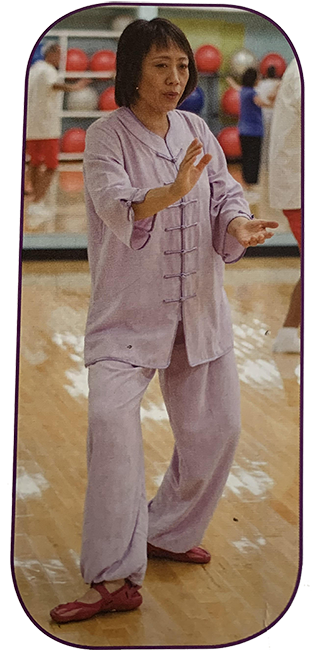About
A Gentle Path to Fitness
Republished in part - originally published in Bismark ND Tribune. Article by Sarah Feist; Photos by DeAnne Billings

Vicki Zhao grew up playing volleyball in China, but her athletic career came to a sudden halt when she broke her ankle in college. As part of her recovery, she took a Tai Chi class at her university. She has now been practicing the ancient Chinese martial art for more than 20 years.
Zhao was the first Chinese instructor teaching traditional tai chi (aka taiji) in BIsmarck, North Dakota. She served as an instructor for the Missour Valley Family YMCA's Primetime Wellness program, which provides resources and support to help participants age 65 and over live independant, vital and healthy lives. Through her various courses, people of all sizes, ages and abilities have benefited from Tai Chi practice.
Zhao was the first Chinese instructor teaching traditional tai chi (aka taiji) in BIsmarck, North Dakota. She served as an instructor for the Missour Valley Family YMCA's Primetime Wellness program, which provides resources and support to help participants age 65 and over live independant, vital and healthy lives. Through her various courses, people of all sizes, ages and abilities have benefited from Tai Chi practice.
Although most U.S. programs prefer the spelling "Tai Chi", Zhao notes this name can cause confusion among martial arts practicitioners. The second word in tai chi (pronounced "tie-chee") has the same English pronunciation as qi, as in qigong ("chee-kung"), another Chinese mind and body meditation exercise. Thus Zhao prefers to use the Chinese term "taiji", which is short for "taijiquan".
A core concept of taiji is yin and yang. Zhao says yin and yang are two principles in Chinese philosophy that make up the universe and everything in it. Tijiquan is a practice that supports the balance of the two.
"Yin and Yang oppose each other yet support each other," Zhao explains. "In this belief, people's yin and yang need to be in balance in order for them to be healthy."
Taiji movements are graceful, flowing, gentle and non-competitive. Participants use slow, meditative body movements designed to promote inner peace. Zhao regulary reminds her students that they are practicing martial arts, as every taiji posture can be used in self-defense. Zhao says her students are especially exicted when she demonstrates how these moves can be used. The most popular series of movements is 24-form yang style taijiquan, which was established as China's national form by the Chinese Sports Committee in 1956. This form only takes about six minutes to complete.
"Taiji can increase energy, balance and flexibility while also reducing stress," Zhao says. These benefits have helped taiji earn its reputation as "medicine in motion," or "Meditation in motion," and as an exercise with "no pain, big gains."
"Western medicine, naturopathic medicine and mental health specialists all recommend taiji as an effective method of pain and stress management and as part of a healthy lifestyle," Zhao says. There is evidence that taiji may also help reduce risk of falls, enhance your quality of sleep, improve joint pan and enhance the immune system.
In addition to the health benefits, taiji is simple and safe exercise. No equipment besides loose comfortable clothing is required, and you can do it alone, in a group, indoors or outdoors. There are few limitations to practicing taiji. If you are unable to stand, Zhao also teaches chair taiji. In North Dakota, her oldes student was 99 years of age.
Zhao encourages all of her students to perform moves within his or her comfort zone, to push themselves but also to relax. Taiji is low impact with minimal stress on muscles and joints, suitable for all ages and fitness levels. (Zhao does recommend those with health concerns first consult with their physicians before starting taiji exercises.)
As an instructor, Zhao also offers her students something special by teaching participants to speak some basic Chinese, such as counting with numbers and the words for "hello," "thank-you," "goodbye," and "inhale" and "exhale." Her students may not realize their teacher's full range of expertise -- Zhao also holds a bachelor's degree in Chinese language and literature and a master's degree in Chinese writing theories. Zhao enjoys passing along her skills to her students and seeing how they thrive by speaking a new language, with their movements as well as their words.

